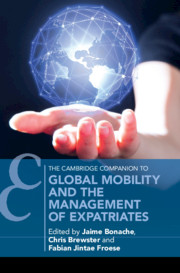Book contents
- Global Mobility and the Management of Expatriates
- Cambridge Companions to Management
- Global Mobility and the Management of Expatriates
- Copyright page
- Contents
- Figures
- Tables
- Contributors
- 1 Global Mobility
- Part I The Expatriation Process of Corporate Expatriates
- 2 The Recruitment, Selection, and Preparation of Expatriates
- 3 Expatriate Adjustment
- 4 Performance Management for Expatriates
- 5 Compensating Global Mobility
- 6 Repatriation and Career Development
- Part II Different Types of Expatriates and Stakeholders
- Index
- References
5 - Compensating Global Mobility
from Part I - The Expatriation Process of Corporate Expatriates
Published online by Cambridge University Press: 12 November 2020
- Global Mobility and the Management of Expatriates
- Cambridge Companions to Management
- Global Mobility and the Management of Expatriates
- Copyright page
- Contents
- Figures
- Tables
- Contributors
- 1 Global Mobility
- Part I The Expatriation Process of Corporate Expatriates
- 2 The Recruitment, Selection, and Preparation of Expatriates
- 3 Expatriate Adjustment
- 4 Performance Management for Expatriates
- 5 Compensating Global Mobility
- 6 Repatriation and Career Development
- Part II Different Types of Expatriates and Stakeholders
- Index
- References
Summary
In this chapter, we provide a review of mainstream practice and research on global mobility compensation. We begin by briefly explaining the traditional system used for international compensation, namely, the balance sheet system, and identify its main advantages and weaknesses. We then describe and structure the current landscape of international compensation, highlighting the increasing variety and complexity that characterizes this essential area of global competitive dynamics in human resources. The paper concludes with a discussion of some topics and themes for future research in this area.
Keywords
- Type
- Chapter
- Information
- Global Mobility and the Management of Expatriates , pp. 100 - 124Publisher: Cambridge University PressPrint publication year: 2020

